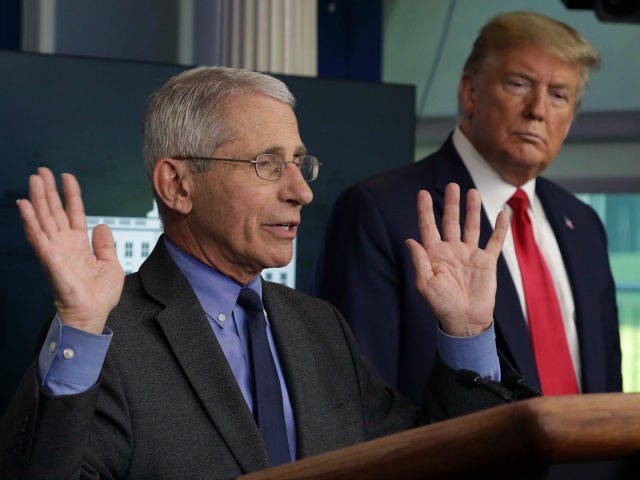Dr. Anthony Fauci, who weeks ago warned the U.S. could be in for a “dark time” January, told the New York Times former President Trump urged him to “be more positive” when offering his outlook on the Chinese coronavirus — a tone he has seemingly embraced in Trump’s absence as he now suggests infections may be plateauing.
Fauci, the director of the National Institute of Allergy and Infectious Diseases and former member of the Trump administration’s White House Coronavirus Task Force, told the Times that there were a “couple of times” that former President Trump would reprimand him for offering a pessimistic view “about what direction we were going” in terms of the Wuhan virus. Trump, Fauci said, would sometimes call him and ask, “Hey, why aren’t you more positive? You’ve got to take a positive attitude. Why are you so negativistic? Be more positive.”
“Did he say why?” the Times asked, later asking if Trump listed a specific reason he was expressing disappointment in the immunologist’s outlook.
“He didn’t say, ‘This is killing the stock market’ or ‘This is killing my chances for re-election’?” the Times pressed.
“No. I didn’t get into the whys or anything. He would get on the phone and express disappointment in me that I was not being more positive,” Fauci answered, adding that Trump “didn’t do that kind of specificity.”
“He just expressed disappointment,” he added.
Throughout the pandemic, particularly while Trump was in office, Fauci continued to offer a gloomy outlook on the Chinese coronavirus. During a press conference with New York Gov. Andrew Cuomo (D) in December, Fauci warned of a “dark time” in January due to the prevalence of small holiday gatherings across the country:
More people are going to travel over Christmas. They’re going to have more of those family and friends gatherings that you accurately said are an issue, so if those two things happen and we don’t mitigate well, we don’t listen to the public health measures that we need to follow, that we could start to see things really get bad in the middle of January.
“Without substantial mitigation, the middle of January could be a really dark time for us,” he continued. Days later, Fauci urged Americans to limit their Christmas gatherings to curb the spread of the virus.
“This cannot be business as usual this Christmas because we’re already in a very difficult situation, and we’re going to make it worse, if we don’t do something about it,” he explained.
Even Fauci’s overall prediction on when the U.S. could return to a state of normalcy came with a dose of pessimism. He told PODCAST-19 last month that the U.S. could reach “very close to a degree of normality” next fall but provided a caveat. That would likely only occur if an “overwhelming majority” of the population received a vaccination.
Notably, Fauci has struck a demonstratively different tone in the early days of Biden’s presidency, suggesting during a recent press conference that infections in the U.S. could be plateauing. Democrat leaders have also taken a drastic turn, opting to begin reopening their states. The decisions appear to coincide with Trump’s recent departure from the White House.
Fauci has since said that he feels liberated speaking out under Biden’s administration.
“I can tell you, I take no pleasure at all in being in a situation of contradicting the president, so it was really something that you didn’t feel that you could actually say something and there wouldn’t be any repercussions about it,” Fauci said.
“The idea that you can get up here and talk about what you know, what the evidence, what the science is, and know that’s it — let the science speak,” he continued. “It is somewhat of a liberating feeling.”
On Inauguration Day, the World Health Organization (W.H.O.) announced modifications to testing criteria which could result in fewer positive cases reported.

COMMENTS
Please let us know if you're having issues with commenting.